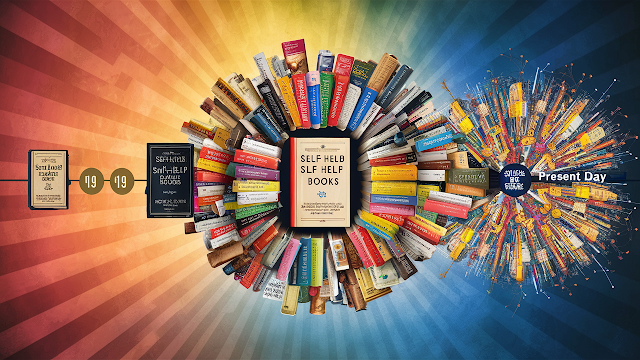These products are selling fast ! Check Out
1. Early Beginnings: Ancient Wisdom and Philosophy
- Classical Origins : The concept of self-improvement can be traced back to ancient texts and philosophies. For example:
- Ancient Greece : Philosophers like Socrates and Aristotle wrote about the importance of self-knowledge and virtue.
- Eastern Traditions : Texts such as the Bhagavad Gita and Confucian Analects provided guidance on leading a moral and fulfilling life.
- Religious Influence : Many early self-help ideas were rooted in religious and spiritual texts, which offered moral and ethical guidance for personal conduct.
2. The 19th Century: The Birth of the Modern Self-Help Movement
- Industrial Revolution : As society shifted from agrarian to industrial, there was a growing emphasis on individual success and self-reliance.
- Foundational Works :
- Samuel Smiles’ "Self-Help" (1859) : Often credited as the first modern self-help book, it emphasized the virtues of hard work, perseverance, and self-discipline.
- Ralph Waldo Emerson : His essays, such as "Self-Reliance," encouraged individualism and personal responsibility.
- Cultural Shift : The focus moved from collective religious salvation to individual moral improvement and success.
3. The 20th Century: Expansion and Diversification
- Post-War Era : After World War II, there was a surge in self-help literature as people sought ways to improve their lives in a rapidly changing world.
- Dale Carnegie’s "How to Win Friends and Influence People" (1936) : A milestone in self-help literature that focused on interpersonal skills and personal success.
- Norman Vincent Peale’s "The Power of Positive Thinking" (1952) : Popularized the concept of positive thinking as a tool for personal success.
- Rise of Psychology : The integration of psychological concepts into self-help books:
- Abraham Maslow and Carl Rogers : Their humanistic psychology influenced many self-help books that focused on self-actualization and personal growth.
- Popular Psychology : Books like "I’m OK – You’re OK" by Thomas Harris brought psychological concepts to the mainstream.
- Diverse Topics : The genre expanded to cover a wide range of topics, including financial success, relationships, mental health, and spirituality.
4. The Late 20th Century to Early 21st Century: The Commercialization and Digital Age
- Mass Market Appeal : The self-help industry grew into a multi-billion-dollar market, with books catering to every aspect of personal and professional life.
- Tony Robbins and Stephen Covey : Became household names with bestsellers like "Awaken the Giant Within" and "The 7 Habits of Highly Effective People."
- Criticism and Skepticism : As the industry grew, so did criticism. Some argued that the genre often offered oversimplified solutions and lacked scientific backing.
- The Influence of Technology : The rise of the internet and digital media transformed the way self-help content is consumed:
- E-books and Audiobooks : Made self-help content more accessible.
- Online Courses and Apps : Provided interactive and personalized approaches to self-improvement.
- Social Media : Influencers and online communities began to shape the self-help conversation, making advice more democratized but also more fragmented.
5. The Present and Future: Trends and Innovations
- Mindfulness and Wellness : The focus has shifted towards holistic approaches that integrate mental, emotional, and physical well-being.
- Books on Mindfulness : Such as Jon Kabat-Zinn's "Wherever You Go, There You Are," emphasize living in the present moment.
- Science-Backed Self-Help : Increasing demand for evidence-based self-help has led to the rise of books that blend scientific research with practical advice.
- Atomic Habits" by James Clear : Uses behavioral science to offer strategies for habit formation.
- Personalization and Customization : The future of self-help may involve more personalized approaches, with technology enabling tailored advice and interactive experiences.
- Ethical and Inclusive Self-Help : There’s a growing emphasis on creating self-help content that is more inclusive and sensitive to diverse experiences and backgrounds. more reading










